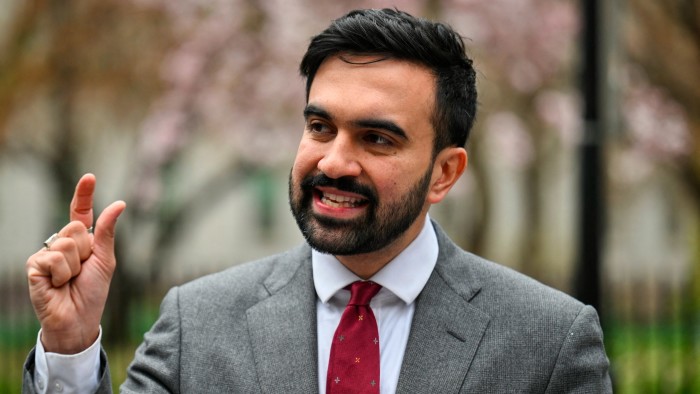Unlock the Editor’s Digest for free
Roula Khalaf, Editor of the FT, selects her favourite stories in this weekly newsletter.
Sir Keir Starmer will on Thursday launch a new trade strategy focused on boosting UK services exports, while strengthening anti-dumping defences to protect Britain from the fallout from Donald Trump’s global tariff war.
Trade minister Douglas Alexander said Starmer would set out a policy based on hard-headed “pragmatic patriotism”, embracing free trade and seeking to build markets across the world, including China and the Gulf.
“Our strategic response to this new world can’t be based on nostalgia or post imperial delusion, let alone any ideological or dogmatic attachment to one trading bloc or another,” Alexander told the Financial Times.
Speaking ahead of the launch, he said the trade strategy would focus on breaking down “behind the border” regulatory barriers to boost exports by Britain’s dominant services sector, worth about £500bn a year.
The strategy will attempt to address the UK’s dismal trade performance since Brexit, which has seen a sharp decline in goods exports that has only been partially offset by robust growth in services.
Real-terms UK trade volumes have grown by just 1 per cent since 2019, while both the EU and G7 have enjoyed an 8 per cent growth, the Centre for European Reform said last month.
Alexander said a new “Ricardo fund” — named after the free trade economist — worth “tens of millions of pounds” would help UK regulators and overseas teams identify and tackle barriers to services trade.
“In a time of tariffs, global services trade is booming,” he said. “This trade strategy recognises it as an indispensable element of the UK’s contemporary export earnings.”
Alexander said the strategy would also toughen Britain’s trade defences to stop it becoming the victim of dumping and unfair trade practices in an “increasingly protectionist world”.
The UK is currently the only country to strike a deal with Trump to avoid the worst of his tariffs. However, it is still watching for spillover effects of US-China trade tensions that have seen Chinese exports to America drop by 34.5 per cent in May, according to customs data.
“We will promote what we can and protect what we must,” he said. “We will expand and sharpen our range of trade defence tools in our toolbox to be able to respond to unfair competition.”
Alexander said the strategy would also aim to get small and mid-sized businesses exporting more, especially to Europe, and to help them navigate post-Brexit red tape.
Shevaun Haviland, director-general of the British Chambers of Commerce, welcomed the strategy, saying: “We have been banging the drum on trade strategy for the past four years and now it’s in fashion. Only 10 per cent of UK businesses export, and that is not enough.”
Alexander said the trade policy would look to build on the EU-UK deal signed last month, which began removing some Brexit obstacles to trade, notably in foodstuffs and animal products and energy markets.
However, government estimates are that the package would create a GDP uplift of just 0.3 per cent in 2040 — a tiny fraction of the 4 per cent long-run hit to GDP from Brexit estimated by the Office for Budget Responsibility.
“I would argue the agreement on May 19 was not a single standout event but the start of a process of annual UK-EU summits,” Alexander said. “We will keep talking, keep working and keep seeking opportunities for British business.”
The “hard-headed” approach to trade would also mean continuing to build commercial ties with China. He insisted that Washington did not have a veto over UK policy, despite the US linking its trade deal with Britain to closer scrutiny of China’s role in supply chains.
“We remain and will remain a sovereign actor on trade policy,” he said. “We take seriously our responsibility on issues like investment security and economic security but those decisions will be taken in London.”
Meanwhile, Alexander’s team is in the late stages of negotiating what they hope will be a free trade agreement with the six countries of the Gulf Cooperation Council, or GCC.
Unions have expressed concerns the deal will not address workers’ rights issues in the region, but Alexander insisted the UK was trying. “We are seeking legally binding chapters in the FTA with the GCC on environmental standards and on labour standards.
“You can’t address everything in trade deals but it’s important that you have that approach reflected in your negotiations.”
The Labour government is also seeking trade agreements with Switzerland and South Korea. While FTA’s had a role, Alexander stressed that “we can’t afford to be a one club golfer.”
The new trade strategy would target more narrowly focused digital trade agreements, and deals for the mutual recognition of professional qualifications.
Asked whether the trade strategy marked a technocratic shift from the “buccaneering” approach advocated by Boris Johnson after Brexit, Alexander said: “I want to devise a trade strategy based on data and not post-imperial delusion.”






